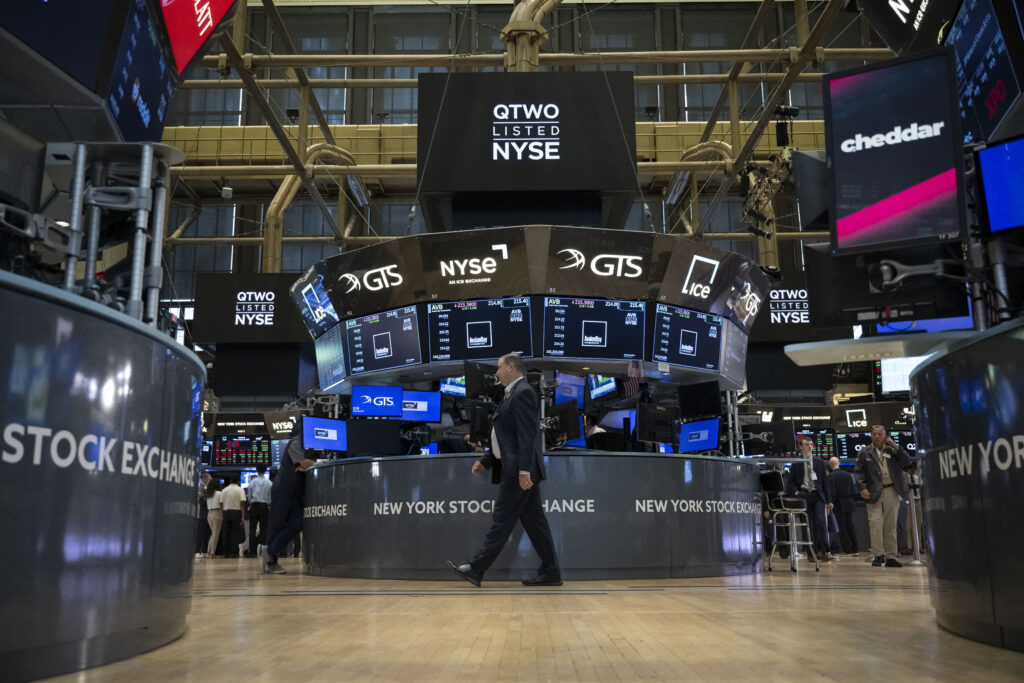
- Indices
- Stocks
Dow Jones closed at record high
Do you want to know how to make money from this?
Register for free and get expert advice, access to a training course and webinars.
Key points:
- Strong U.S. economic data pushes Dow Jones to new record high.
- Nvidia’s forecasts miss investors’ expectations, hurting tech-heavy Nasdaq.
- Positive consumer sentiment data boosts U.S. chances of avoiding recession.
Following the trading results on Thursday, the Dow Jones Industrial Average set a new historical closing maximum, rising by 0.59% to 41,335.05 points. This growth was due to the publication of positive economic data in the United States. At the same time, the Nasdaq Composite index fell by 0.23%, closing at 17,516.43 points. The reason for the correction was the report of Nvidia, a leader in the production of chips for artificial intelligence. Although the company’s forecasts were generally correct, they didn’t have the expected effect on investors.
The S&P 500 index closed trading virtually unchanged, stopping at 5,591.96 points, which is only slightly below its record closing maximum set in July. Continuing expectations of an interest rate cut in September had a stabilizing effect on the market.
Nvidia disappoints investors
Although Nvidia, a leading maker of chips for artificial intelligence, has traditionally beaten market expectations, the company’s guidance for the current quarter has disappointed investors. The report, published late Wednesday evening, contained less optimistic estimates than analysts had hoped, which led to a drop in Nvidia shares by more than 6%. As a result, the company’s growth for the whole of 2024 was reduced to 137%.
The market reaction to Nvidia’s report was mixed. Shares of other companies closely associated with the development of artificial intelligence showed mixed dynamics. For example, the value of Microsoft shares increased by 0.6%, while shares of Alphabet, the parent company of Google, fell by 0.7%. In addition, shares of Broadcom and Advanced Micro Devices lost almost 1% of their value.
In its report, Nvidia provided a gross profit forecast for the third quarter, which may be lower than the market expectations. At the same time, the revenue forecast was generally in line with the analyst consensus. However, investors were concerned about the slowdown in the growth rate of new Blackwell chips in the current quarter.
In recent weeks, large tech companies have faced investor concerns about the slow return on significant investments in the development of artificial intelligence. Shares of Microsoft and Alphabet, for example, fell after the publication of their quarterly reports last month.
On the back of these developments, Apple shares rose 1.5%. This growth was driven by a positive research report from investment bank Citigroup, which named Apple its top pick in the artificial intelligence sector. According to media reports, Apple and Nvidia are in talks to invest in OpenAI, the developer of the popular chatbot ChatGPT. The new investment could value OpenAI at more than $100 billion.
CrowdStrike, a cybersecurity company, rose 2.8% after the company reported revenue beat estimates for the latest quarter.
US economy grows better than expected
The U.S. economy grew faster than previously expected, helped by stronger consumer spending, the Commerce Department said, bolstering the view that the U.S. is likely to avoid a recession.
“The combination of lower inflation and rising consumer spending is creating favorable conditions for what’s called a soft landing,” said Jeffrey Roach, chief economist at LPL Financial. That term refers to a decline in inflation without a significant hit to growth.
Initial jobless claims came in slightly below expectations, the Labor Department said, signaling continued stability in the labor market.
Consumer spending reports for July, due out Friday, are expected to provide additional clues about the Federal Reserve’s monetary policy trajectory. Analyzing these data will provide a clearer picture of whether further tightening or easing of monetary conditions is needed.
Do you want to know
How to make money from the news
Register for free and get:
- Expert consultation;
- Access to the training course;
- Opportunity to participate in webinars

